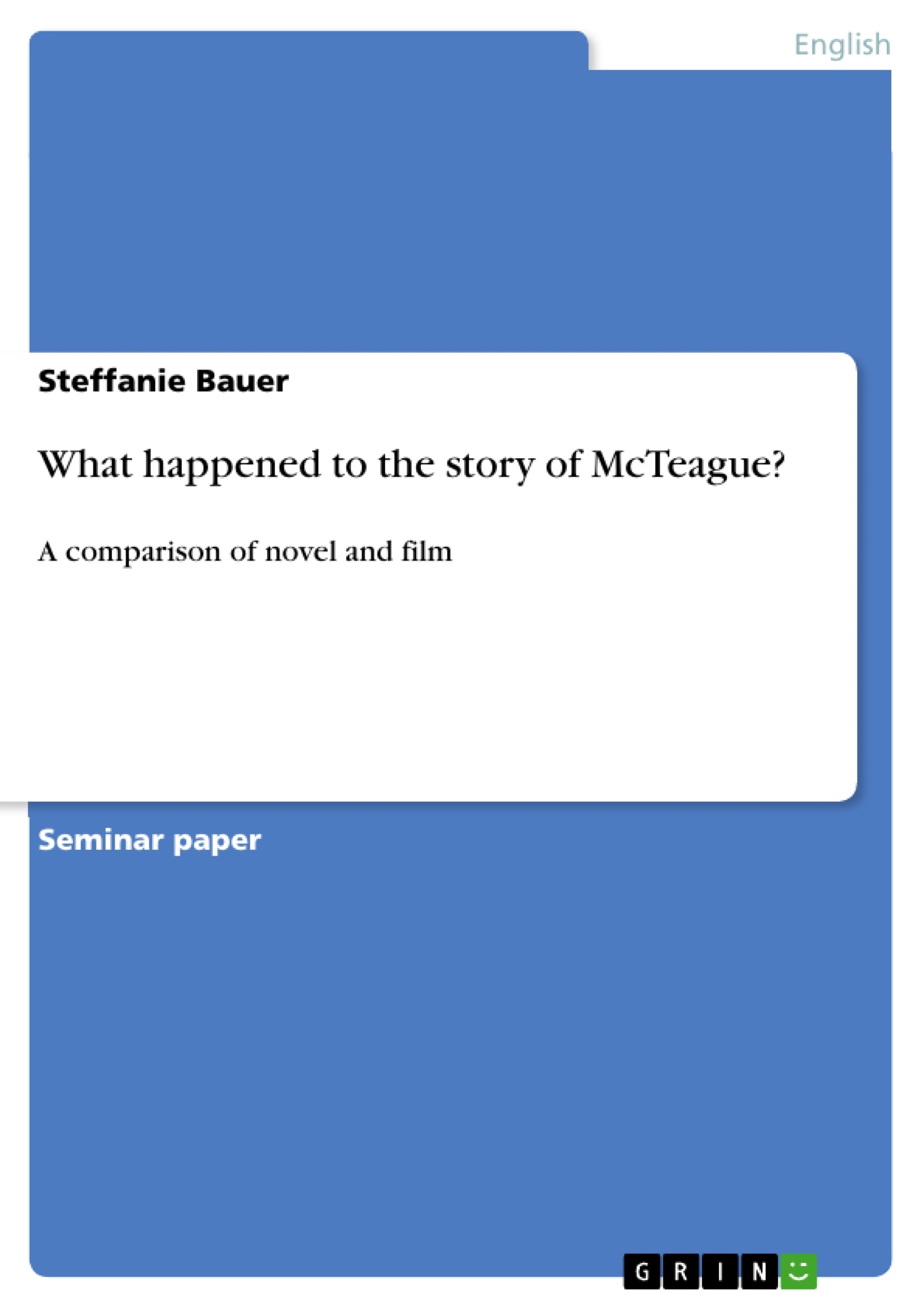1. Introduction
This paper will deal with a critical analysis and comparison of the novel McTeague: A story of San Francisco, written by Frank Norris and published in 1899, and the 2 hour version of the movie Greed produced in 1924 by Erich von Stroheim.
First of all, I will give a short summary of the novel, pointing out several aspects that make it a typical naturalistic novel.
Then I will go on by giving some brief background information on the production of the movie, describing its metamorphosis from a nine hour epos to a commercial film of about 2 hours and 15 minutes.
According to this, I will discuss this shortening, give examples of what was left out of the original version and try to give reasons for that. Furthermore, I will look at the effects this had on the original story and discuss the question whether the film version can still be regarded as belonging to the naturalistic genre. Doing so, I will discuss complete scenes and shorter passages which are mentioned in the book and not in the novel and vice versa, and passages that are slightly changed.
I claim that Greed is still a naturalistic piece of art though in a weaker form by pointing out striking elements that remained in the movie.
Table of Contents
- Introduction
- What happened to the story of McTeague
- A brief summary of "McTeague"
- The naturalistic elements in this novel
- Heredity
- Influence of the environment
- Conspicuous consumption
- The production of the movie Greed
- Deleted characters
- Deleted or changed scenes
- Is Greed still naturalistic?
- Conclusion
Objectives and Key Themes
This paper critically analyzes and compares the novel McTeague, written by Frank Norris and published in 1899, with the movie Greed, produced in 1924 by Erich von Stroheim. It aims to highlight the naturalistic elements in both works, explore how the movie deviates from the source material, and investigate whether Greed maintains its naturalistic nature despite its adaptation.
- Naturalistic themes in literature and film
- Adaptations and their impact on original works
- The influence of social and environmental factors on characters' actions and fates
- The role of heredity and instinct in shaping human behavior
- The pervasiveness of materialism and its consequences
Chapter Summaries
- Introduction: This chapter provides an overview of the paper's objective, which is to examine the relationship between Frank Norris's novel McTeague and Erich von Stroheim's film Greed. It also briefly introduces the concept of naturalism in literature and its prominent themes.
- What happened to the story of McTeague: This chapter delves into the plot summary of the novel McTeague, highlighting key characters and events. It further examines the novel's naturalistic aspects, focusing on the influence of heredity, the environment, and conspicuous consumption on the protagonist's life.
- A brief summary of "McTeague": This chapter provides a concise summary of the novel, outlining the main events and characters, including McTeague, Trina, and their relationship. The chapter touches upon how the novel depicts the influence of social class and societal structures on the characters' destinies.
- The naturalistic elements in this novel: This chapter explores the key naturalistic elements in the novel, including the role of heredity, the impact of environment, and the phenomenon of conspicuous consumption in shaping the characters' lives and choices. The chapter also analyzes how the novel's characters are depicted in a deterministic light, influenced by their biological inheritance and societal circumstances.
- The production of the movie Greed: This chapter delves into the background of the movie adaptation of McTeague, known as Greed. It discusses the creative process behind the film and how it underwent significant changes, including the removal of certain characters and scenes, leading to a significantly shorter version from the original nine-hour epos.
Keywords
This paper explores the key concepts of naturalism in literature and film, focusing on the novel "McTeague" by Frank Norris and its adaptation, "Greed," directed by Erich von Stroheim. The analysis focuses on the influence of heredity, environment, conspicuous consumption, and social Darwinism on the characters' lives and destinies. It also examines how the adaptation process affected the original work's themes and narrative.
- Quote paper
- Steffanie Bauer (Author), 2007, What happened to the story of McTeague?, Munich, GRIN Verlag, https://www.grin.com/document/154409




